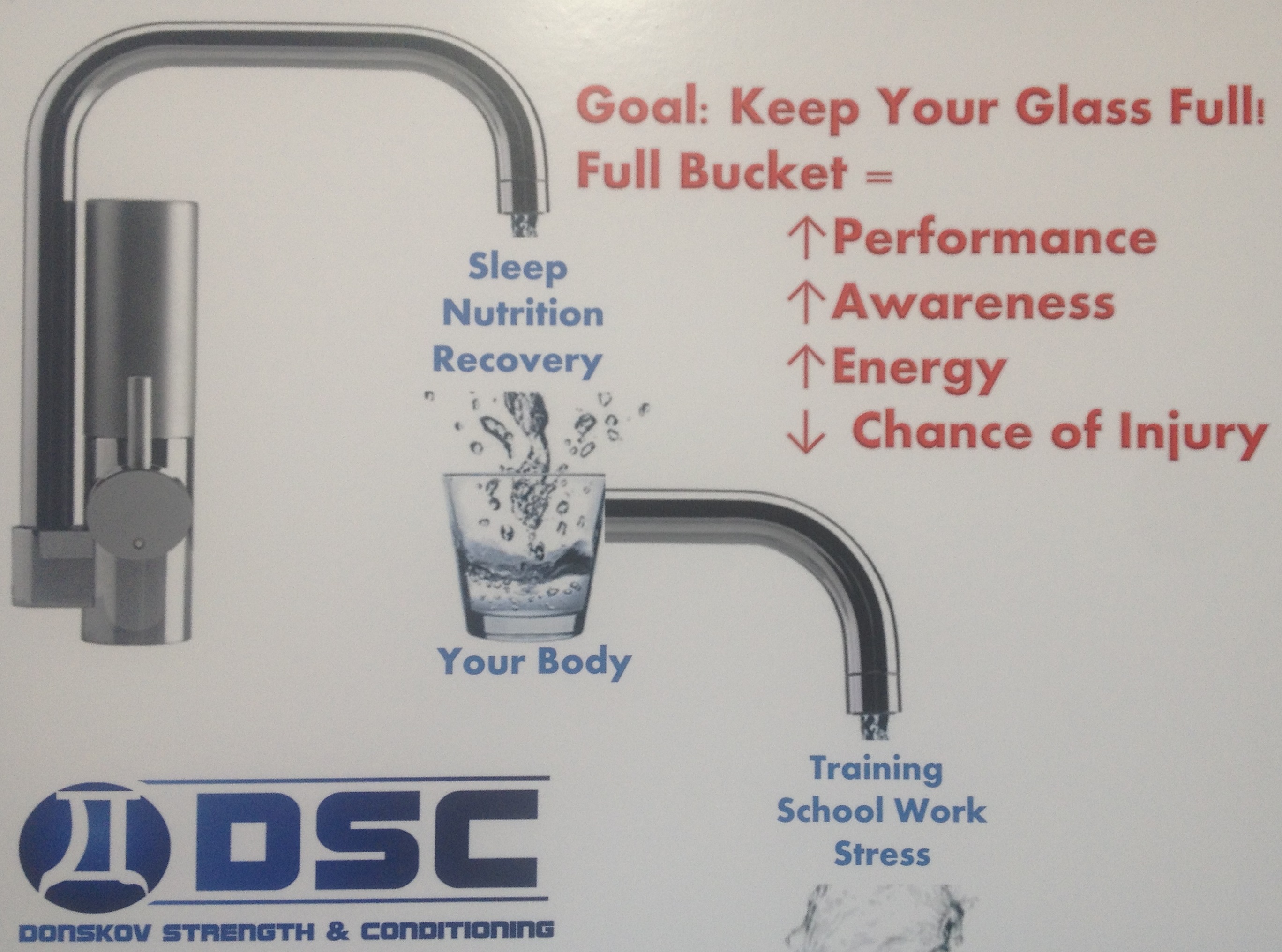The weight room is a demanding place. Mechanical loading, physiological disturbance, and psychological stress are just a few of the cumulative stressors that can leave us feeling sore, tired, irritable, and just plain exhausted. If we continue to pull from these “reserves” without giving back, various hormonal imbalances, overtraining syndromes and chronic musculoskeletal injuries may be the direct outcome. Furthermore, if lean muscle mass is the goal, the importance of “working in” is your trump card. We believe in this so much that at DSC we have a picture hanging from our gym walls (many thanks to Jeff Cubos) that serves as a constant reminder of the importance in the decisions made outside the confines of the gym. Bottom line: you can’t get the most out of your workout, unless you are taking the time to “work in”. Below are three tips in keeping your glass full!

1.) 8 Hours of Sleep Each Night
In 1910 the average adult slept 10 hours/night. Now we’re lucky to get five to six hours of quality sleep. Artificial lighting, late night TV shows and technology have changed the environment. When you change the environment, the environment changes you. Our immune system is governed by melatonin and prolactin. Melatonin in particular is a very important hormone that controls the sleep/wake cycle and our bodies’ circadian rhythm. Short nights, blunt the production of melatonin and lead to a cascade of hormonal events that can cause hypothalamic fatigue, increased cortisol levels (high at night/low during the day) and altered insulin levels. Here is an overview courtesy of the book Lights Out:
Short nights mean…
- Reduced melatonin, which reduces white cell immune function.
- Less prolactin at night (at night means stronger Natural killer and T cells). Prolactin during the day means autoimmunity and carbohydrate craving.
- The biggest problem with short nights year round is that insulin will stay higher during the dark (when it should be flat) and cortisol falls too late so it won’t come up early in the morning.
2.) Eat Real Food
“Let us cease pretending that tooth-brushes and tooth paste are any more important than shoe brushes and shoe polish. It is store food which has given us store teeth.” (Dr. Hooton) Shop the periphery of the grocery store. If it wasn’t food 100 years ago, it isn’t food today! Replace the Ho Ho’s, Bon Bon’s, potato chips, white bread, and cereal with good old-fashioned vegetables lean protein, fruit and healthy fat. Avoid processed sugar, white bread and refined table salt. These foods rob our skeleton and do not provide the necessary vitamins and minerals for growth. Mineral deficiency=System deficiency. “The system borrows minerals from the skeleton to maintain vital processes. This is what we are doing with our skeletons by the process of borrowing, simply because we fail to provide new body repairing material each day in the food. Minerals help manufacture blood.” (Nutrition and Physical Degeneration). Here are a few of our “Super Foods” courtesy of Precision Nutrition:
Proteins:
- Lean Red meat (93% lean, top round, sirloin)
- Salmon
- Omega-3 Eggs
- Low-Fat, plain yogurt (lactose-free if you can find it)
- Protein Supplements (milk protein isolates, whey protein isolates or vegan protein sources
Vegetable & Fruits:
- Spinach
- Tomatoes
- Broccoli
- Cabbage
- Cauliflower
Other Carbohydrates:
- Mixed beans
- Quinoa
- Whole oats
3.) Drink Single Ingredient Beverages
Drink half your body weight in ounces each day! That means if you weight 175 lbs., drink 87.5 ounces of water. That’s five, 16oz bottles of water each day. Not Gatorade, pop, coffee, tea and energy drinks…drink water! Want to get strong? Drink water! Want to stay lean? Drink water! Want to move, feel and perform better? Drink water! Why water? Here are a few reasons based on an excellent read from Dr. Batmanghelidj’s book The Bodies Many Cries for Water:
- The human body is composed of 25% solid matter (solute) and 75% water (solvent).
- It is the solvent-the water content-that regulates all functions of the body. Including the activity of all the solutes (the solids) that are dissolved in it.
- “Water distribution” is the only way that not only an adequate amount of water, but also its transported elements (hormones, chemical messengers and nutrients) first reach the more vital organs.
- Products manufactured in the brain cells are transported on “waterways” to their destination in the nerve endings for use in the transmission of messages.
- Fully, the water volume that is stored in the disc core supports 75% of the weight of the upper part of the body; the fibrous materials around the disc support 25%.
The decisions that you make away from the gym build champions. If you train 4/week for 90 minutes, that’s 6 hours each week out of a total 168 hour work week. That’s a lot of time to “work in.” It may mean the difference between recovery or overuse, regeneration or strain. The choice is yours. It is always better to perform with a full glass! If you want to get the most out of your workouts, you must be consistent “work in."
References:
- Batmanghelidj, F., The Body’s Many Cries For Water, Global Health Solutions, 1997.
- Price, W., Nutrition and Physical Degeneration, Price-Pottenger Nutrition Foundation, 2012.
- Super Food References: Precision Nutrition
- Wiley, T.S., Lights Out, Pocket Books, 2000.